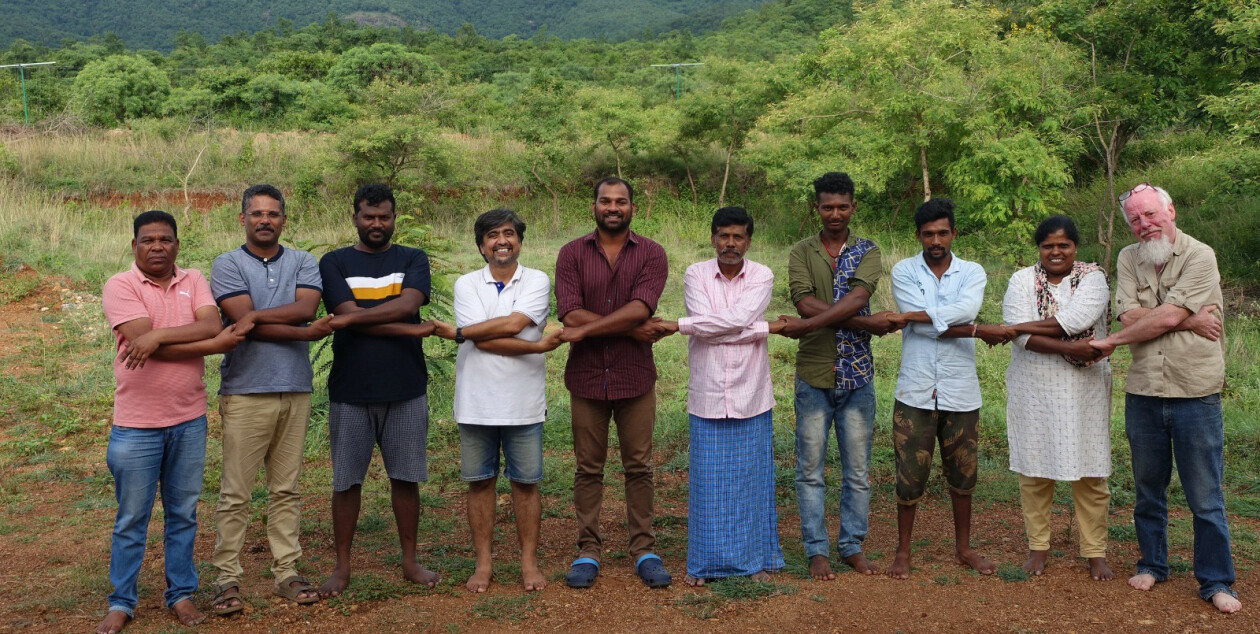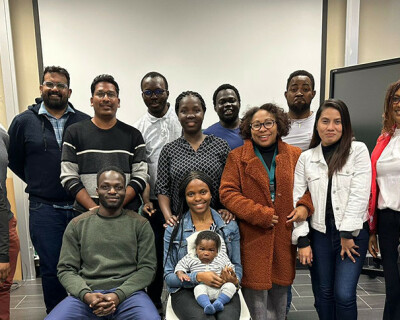Paying it forward


The Institute of Public Health Bengaluru (IPH Bengaluru), a partner of ITM, holds a special place for public health specialists in Southern India. Since its establishment in 2005, it has been a nurturing ground where young researchers and academics have spread their wings under the guidance and support of its founder, Narayanan Devadasan, known to many as Deva, an alumnus of ITM. In June 2023, the four-year tenure of Upendra Bhojani as director ended at IPH Bengaluru. He passed the torch to his long-time colleague and fellow researcher, NS Prashanth. Upendra and Prashanth, both mentees of Deva and ITM alumni themselves, are proud to follow in his footsteps and aim to grow their beloved institute and its dedicated staff to their fullest potential.

Tell us about your beginnings. How did you end up at IPH?
UPENDRA My life began far away from bustling Bengaluru. My parents were schoolteachers and we lived humbly, in a small village in the western state of Gujarat. I was first confronted with big city life when I went to university in the city of Ahmedabad – a huge adjustment! I studied dentistry, but quickly realised that starting a private practice was not in the cards for me, because that felt like running a business. However, dentistry gave me access to a lot people’s mouths, and sadly, to many instances of oral cancers due to wide-spread chewing tobacco use, which sparked my interest in public health.
At the time there were no options in India to study public health, especially as a dentist, so with a big leap of faith I took out a major student loan and pursued an MPH in Melbourne, Australia. That was my first time ever on an airplane! (laughs) During my training, while busy trying to secure internships, I “bumped into” Deva on a – by now extinct – social media platform, Orkut, on a thread on health equity. He very generously offered me one year of support if I came to Bengaluru. He had a real passion for giving young people opportunities. He appreciated the new ideas we brought to the table and – thanks to the DGD framework agreements with ITM – was able to give us quite some academic freedom.
Once back in Gujarat, I took a two-day long train ride down South and joined IPH in 2007. I settled in quickly in Bengaluru: I found the city green and its inhabitants very accommodating, even though I did not speak the local language at the time.

PRASHANTH Nice to hear that about Bengaluru. It is indeed very multicultural. I am from the southern state of Karnataka, where Bengaluru is also located. I was trained as a medical doctor, and quickly developed an interest in public health. When I met Deva in 2006 at a training programme, I had already been trying to get into an MPH programme in the US, I was even admitted to one. Deva saw my interest in community engagement and primary health care, and he suggested that I rather apply to his alma mater, ITM in Belgium. He said: “there you will find what you are looking for.” Even after such a brief encounter, he gave me a glowing recommendation letter, which surely helped, because I was by far the youngest in my MPH cohort at ITM (laughs).
Deva really trusted young people and he regarded such acts not as a favor, but as encouragement of young people’s ambition and ideas. I finished my MPH in 2008, and focused on primary health care in indigenous settings, which remains my main research area to this day. I kept in touch with Deva throughout my masters studies and joined his team in 2008 to work on district health system strengthening programme in Tumkur, not too far from Bengaluru.

But your ITM journey did not end there, is that correct?
PRASHANTH Very correct (laughs). That was just the beginning! Not long after this, I embarked on a sandwich PhD journey at ITM, focusing on my Tumkur project. I defended my thesis in 2015 at UC Louvain. I am indebted to my ITM supervisor, Bart Criel, and to other ITM professors such as the late Guy Kegels, Wim Van Damme and Bruno Marchal, all of whom I learned a lot from on health systems and health system organisation.
UPENDRA …And I followed Prashanth soon after! My PhD topic was strengthening the role of local health systems to improve chronic disease care for urban poor in India. I defended my thesis in 2016 at the University of Ghent, with Professors Patrick Kolsteren and Bart Criel as my ITM supervisors. It was wonderful to be in Antwerp for extended periods of time, in such an intellectually stimulating environment. We also made lasting friendships. When at ITM, we always used the office of fellow researcher Werner Soors, so people began calling it the India office (laughs).

Three years later Deva retired as director of IPH. Upendra, you took up this role. What were your goals and challenges?
UPENDRA I basically had three main goals when I started: to bring financial stability, carry out structural reforms in the governance and remain an accessible, available director to the staff. As for the first one, due to a sudden funding crisis for institutions like ours to receive foreign funding, we unfortunately had to part ways with the majority of our colleagues: we shrank from 60 staff members to about 12. After four years, with lots of effort to raise grants, we managed to secure alternative fundings and we are back at 60 staff members, with much less fear of the future. Secondly, in terms of management, we went from a a director-led leadership to a more collective one where team leads at IPH Bengaluru and our board members are much more involved in our governance. So there is more buy-in from our board and also increased accountability. These were all major collective efforts and I am very proud of the entire team for achieving them. Lastly, I tried my best to remain available to my colleagues, and to also reach out to them often. I hope I succeeded.
Did you still have time for your own research?
UPENDRA I quickly realised that directorship will be an all-encompassing job and had to slow down on my own research and delegate more. Now I am eager to get back into it. Call it fatigue or life lessons, but I am less of an (anti-tobacco) activist now; my academic interest turned to the commercial determinants of health and political economy, on how to control businesses that manufacture tobacco, opium, alcohol and cannabis. The effects of the harm industries is even a bigger pandemic than COVID-19, and there are many competing interests. I want to focus on how to keep businesses accountable, also in the informal private sector, which is very influential in India. My recent grant from the Department of Biotechnology and Wellcome Trust India Alliance will help in this work.
PRASHANTH …But let’s not forget all your mentorship work! We have been committed to keeping alive the atmosphere of welcoming young researchers at IPH and supporting them. Upen mentored a lot of colleagues and students during his tenure and his directorship gave me room to work with young people. Both of my PhD students, Meena and Shivanan will defend their PhDs in 2023.
IPH Bengaluru and ITM
The third framework agreement between ITM and Directorate-General for Development Cooperation and Humanitarian Aid (DGD), “Switching the poles”, lasted between 2008-2016. The aim of “Switching the poles” was for the partner institutes to gradually take charge of developing scientific and medical expertise, to lead and be held accountable for their role in the partnership. Over the nine years of collaboration with ITM, IPH made major progress towards this objective, with growing footprint in Indian health policy. Apart from enabling joint recent projects, the DGD programme also contributed to the development of IPH’s wide education portfolio where they train the next generation of public health professionals through e-learning and blended training approaches.
In 2020 ITM signed a memorandum of understanding with IPH Bengaluru, focusing on faculty exchange, technical and research collaboration. As a result, most recently, ITM welcomed four IPH Bengaluru faculty members as lecturers in advanced course components on health systems in our MPH programme.

What are your plans for your four-year tenure, Prashanth?
PRASHANTH My biggest challenge is to continue the organic growth of IPH, to deepen and expand our work. As we mentioned, IPH has no endowment and we rely on grants. This keeps us competitive, but this also makes us very overworked. Hopefully we will find a way to change this.
Similarly to Upen, I was recently awarded a prestigious fellowship from the Department of Biotechnology and Wellcome Trust India Alliance. This grant allowed us to set up a centre for research, training and innovation to examine health inequities in indigenous communities in multiple remote forested regions. Today we have a field station where three experienced researchers live and carry out very embedded, community-engaged work with closed partnerships with indigenous people’s organisations. We hope this will inspire others of similar types of research, to work more closely with communities.
However, we not only find it crucial to stay grounded in local settings, but to also bring these insights to global forums. I remain connected to ITM, as a member of its General Council, I am committed to my work in the Alliance of Health Systems Global, and we are increasingly asked to provide advice to the government.
Above all, we plan to continue enabling talented young people to become impactful researchers. This is the thread binding us, Deva, Upen and me, and hopefully those who will come after us.
Spread the word! Share this story on










